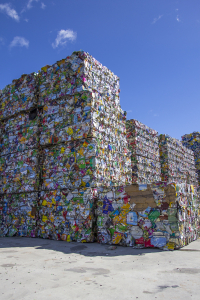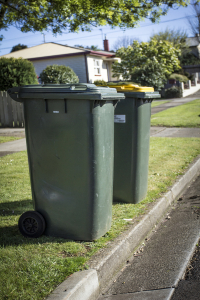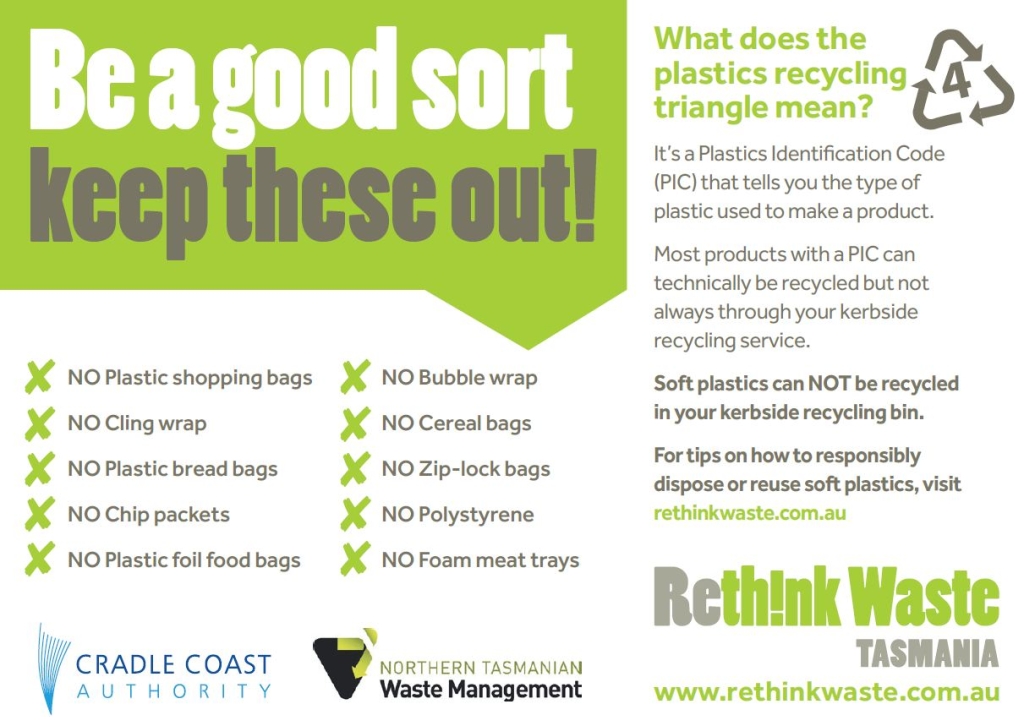Kerbside Recycling Bin Assessments: there’s a Good SORT!
Starting: 11 September 2017
Location: Circular Head, Waratah-Wynyard, Burnie City, Central Coast, Devonport City, Latrobe and Kentish Council areas.
Kerbside Recycling Bin Assessments are coordinated by the Cradle Coast Waste Management Group and take place a couple of times a year in North West Tasmania.
The assessments help tell us whether landfill diversion education campaigns are working and where we might need to focus more attention.
The assessments are also a great opportunity for you to receive advice on some of the more confusing aspects of recycling such as whether foam meat trays can or can’t be recycled (tip: they can’t be recycled via your kerbside bin, even if they feature the plastics identification code triangle).
If your kerbside recycling bin is randomly selected for assessment, the assessor will check the contents of your bin before it gets collected by the truck.
They’re looking for non-recyclable materials, known as contaminants.
The most common contaminants found in kerbside recycling bins are:
Soft plastics, foil food bags, foam meat trays, polystyrene, metal objects and electrical items.
Bins included in the assessment will each receive a sticker, advising of the assessment results and some friendly do’s and don’ts relevant to your kerbside recycling bin contents.
Thank you for being such a Good SORT!
Comparing the results of the last two assessments, we’ve found big reductions in the occurrence of these contaminants:
- Recycling in boxes (down 64%)
- Recycling in bags (down 44%)
- Tissues/tissue paper (down 57%)
- Soft plastic (down 14%)…. Well done everyone!
Want to brush up your recycling skills so you’re ready for the next assessment?
Click the links below for more information:
Recycling Assessments Info Brochure
Where do my rubbish and recycling go?
Waste management and recycling don’t end with the bin…they begin!
 Putting recyclable materials, like bottles or cans, and rubbish in the appropriate bins are just the first step in the safe management of our waste. Some recyclable items will even be converted into new products and materials like newspapers, drinking bottles, or even planes and cars!
Putting recyclable materials, like bottles or cans, and rubbish in the appropriate bins are just the first step in the safe management of our waste. Some recyclable items will even be converted into new products and materials like newspapers, drinking bottles, or even planes and cars!
The recycling journey begins with items being collected and then brought to the Materials Recovery Facility (MRF). There, they are first sorted by hand and then by machines to be baled and processed. This is why it’s important to avoid putting dangerous or inappropriate materials in the recycling bin. Even a single soft plastic bag can block the whole recycling process!
 Waste too has an interesting journey. Landfills are now created with sustainability in mind, meaning they’re designed to control odours and vermin and to avoid water and soil contamination.
Waste too has an interesting journey. Landfills are now created with sustainability in mind, meaning they’re designed to control odours and vermin and to avoid water and soil contamination.
The Cradle Coast and Northern Tasmanian Waste Management Groups support facilities that sort, bundle and transport recyclables to processors. They also support landfill and transfer stations that safely dispose of thousands of tonnes of waste. By doing this, they help keep our community and environment healthy.
You can help by being a good sort and taking waste management seriously. Whether it’s at home, at work, at school or anywhere else, make sure that you toss items in the right bins.
To learn more about the waste managing process:
Fact Sheet: Recycling – Where Does It Go?
Business Tips For Better Waste Management
Or visit our Resources and Links section
Can soft plastics be recycled?
Often there is a little triangle with a number stamped or printed onto plastic products. This is the Plastics Identification Code (PIC) and it tells you the type of plastic used to make a product.
The triangle looks a bit like a recycling symbol and so it’s easy to think that anything with a PIC can be recycled, and technically they can, just not always through your kerbside recycling bin.
As a general rule, don’t put soft plastics in your kerbside recycling bin.
Only hard plastics that can’t be ‘scrunched’ such as plastic bottles, plastic jars, plastic plates etc can be recycled through your kerbside service.
Be a good sort and keep these out of your kerbside recycling bin:
Plastic shopping bags, Cling wrap, Plastic bread bags, Chip packets, Bubble wrap, Cereal bags, Plastic foil food bags, and Zip-lock bags. Soft plastic polystyrene and foam meat trays can also NOT be recycled in your kerbside bin.
So what can be done with soft plastics?
Most major supermarkets have collection points for plastic bags and other soft plastic materials, recycled via the REDCycle program. It’s also a good idea to reuse bags as many times as possible by taking them with you when you go shopping.
Some charity shops also appreciate a donation of plastic bags to use when distributing goods or when selling items in their stores.
Waste silage wrap plastic can be safely disposed at the Sheffield Waste Transfer Station. In Northern Tasmania there is a soft plastic recycler, Envorinex, contact them to find out what materials they are currently accepting.
Want to know more about plastics and the PIC? Check out the Rethink Waste Plastics Identification Code fact sheet.
Another handy resource is the A-Z Guide of Recycling and Waste, which lets you know how to manage different waste products, from aerosol cans to yoghurt containers and everything in between!

